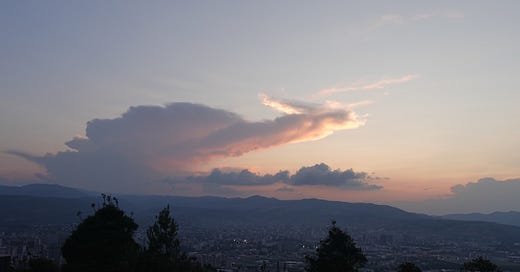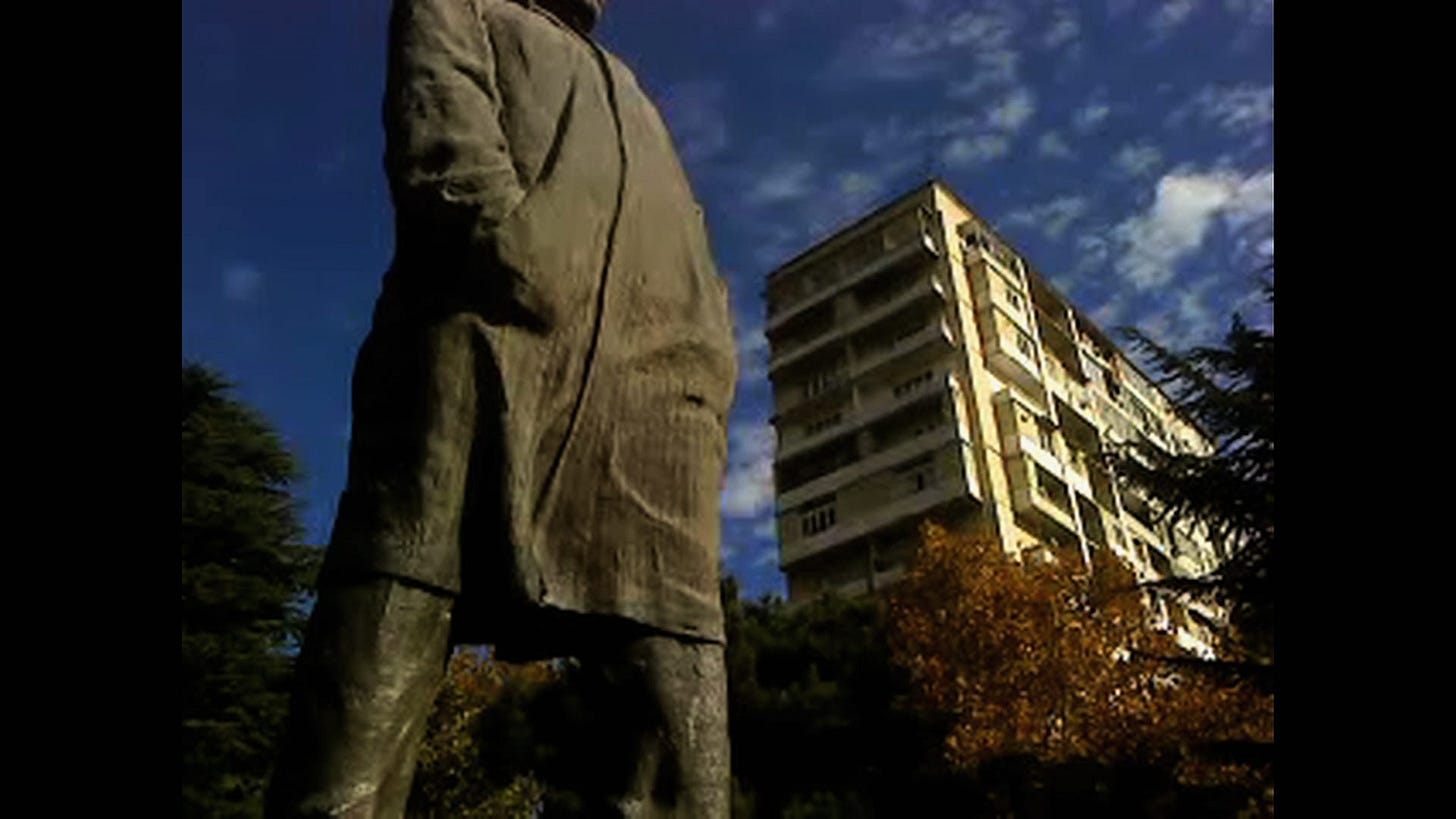The Recrudescence of Inertia
Mundanity, immersion and Koberidze's "Let the Summer Never Come Again"
Laying out in wait; sucking it all up; bearing through the siege; sweating through my paces. Weathering storms. Being still. Inert. Life feels like this. The flow of time. Interminable and rudderless. Beneath all the tinny media apparatus, all the reels and fads and UPF and derision – nothing. An abyss of meaning. Merely inertia taking hold, though one occasionally fancies stillness may hold a glut of latent energy in its melancholic hold. A ceaseless source of movement and possibility. That's what we call desire. And so I sit out wandering around localities, on urban hunts to make meaning, for that hit of connection to the universal substance to make the record needle stop. But it's a pitiful endeavour in some sense. Nothing happens. The mind ticks over. The day moves on. Seasons change. The depression continues.
In this mood, I sat down to watch Alexandre Koberidze's Let the Summer Never Come Again (2017). I'd tried before some years back, and couldn't get past the low quality camera-phone footage, coupled with the three hour plus run-time. It's slow cinema, for sure. Hazy and sun-soaked; redolent of a big come-down. But come-down from what? The city plays a major role, it's effectively the main character. Slow, blurry shots of hot Tbilisi, dusty and run-down. You're forced to immerse yourself in its stifled saturation.
Plenty of film and visual art references come to mind. I was particularly reminded of the work of Straub-Huillet. But times have changed, and the connection between their form of aestheticism and an ideological commitment to the avant-garde seems broken, albeit those ties were always historically contingent. Koberidze's work sits in this post-ideological malaise, for better or worse. A place where the aestheticisation of the present is increasingly divorced from radical traditions of liberation. Cultural memory as meme-fodder.
But this time the viewing was somehow reminiscent of my first engagement with the city in July 2014. The glare, the expanse, the claustrophobia, the simmering quiet, the beauty. The problem of movement, plans going awry; being in place being enough. Immersion. The cracked surface, a failure of artifice, a self-deprecative periphery. It was all so unexpected, so too the eastern familiarity in all the thronging loud life outside, set against the all-too-familiar desire for modernity. The juxtapositions lend themselves to a gauche reading as the postmodern, yet it was all too minor for that. This didn't have the grandeur nor chaotic scale of, say, Istanbul or Delhi, places I was familiar with. Yet there were enough uncanny resonances.
A blandness, slowness, minorness seemed prevalent, all-consuming somehow. I left it – changed – under a cloud of meningitis and didn't return until after the pandemic began, but the saturation never left me. I set up a blog with A at the time and writing started taking shape. And Koberidze's film taps into some of that mundane listlessness, where the dramatic passes by, muted but capacious. Time stretched out, aimless and discordant. Car fumes and rotting fruit. The mass milling about.
We could liken this to decompression. Decompression of the image, of meaning, of narrative, of space. And this works somewhere between loss and alienation. Loss as something like the curtailment of ambition, the end of aspiration, a melancholia for lost futures. The post-soviet condition may feel this more starkly, but it's something which plagues anyone committed to social and political liberation, from the auspices of the failed Third World project through to the general antagonism of the Western metropolis. All produce failure, loss, listlessness, the diminishing of possibility.
But this sort of alienation, that seems particularly constituent of modernity, can reroute one's desire through an aesthetic, creative impulse. So listlessness creates the depressurised conditions for insight and breakthrough. At least that's a thread I have been holding onto for a while. The sublimation of compulsion into the abstract by way of a deep, leisurely approach to the mundane. We can call this study, in the Moten-Harney sense. (Perhaps this is the real key to so-called lifemaxxing?)
Koberidze develops a faux narrative, with a queer relationship being the emergent focal point. One could talk here about desire, contact, the alienation of the city, labour and so on, but in a way the film's form is itself the vehicle in which desire structures itself.[1] The brooding aimlessness, its arbitrary stillness, a disinterested longingness; all aspects of an aleatory poetics taking root, holding forth.
The continual spiralling in the film around the bazaar by the central station also speaks to the all-encompassing immersion that modern life dictates. Here, the subway rides keep on leading back to that site of exchange, as if in a continual loop, a space with no escape (shades of Dark City [1998] perhaps). At the same time, to an outsider, the market activity on show holds this contrapuntal nature of being both onerous and passive. This is commerce operating at a more human level, standing at a distance from the sort of labour discipline and digital mediation that governs most late capitalist wage-labour in the overdeveloped sectors of the world economy. The market, the bazaar, has always had this social aspect that functions as a more human form of technology. Exploitation, alienation, loss still resides, but the antagonism between compulsion and mundanity – interest and desire – plays out on a wider, decompressed canvas, where each instance of transaction produces an affective spark escaping the capture of value.
***
I think a lot about scrolling. Doom scrolling. The low intensity shocks and spikes of social media, conjuring this great patina of drama and noise, of opinions and derivative analysis right at the touch of your finger, and yet beneath it all a great ocean of nothingness. Just the relentless march of time and distraction. The interpellation to speak, to proffer hot-takes, self-representations, individuated identifications with the mediascape drives us into homogenisation. Only flat surfaces, with discrete boxes are permitted. Smart phones and AI as dumbing down and all that. Speech itself becomes a fait accompli. Already mapped out, determined. Subjectivity as a mere flight of fancy. Who's got the time – or money – for an interiority?
I think a lot about difficulty. Leaning into one's quirks. Refusing to be relatable or easily legible. I think about virtuosity. Sly Stone's passing lingers too; an electric showman condensing all of his time's conflicting energy into a popular form of cultural address in all its kaleidoscopic glory. Only to burn out, crushed under the weight of expectation and compulsion. A single-mindedness that promotes idiosyncrasy, yet fully indebted to the emanations of the world around. Living virtuosically. I'm not sure what it should look like – perhaps a hazy, languid vision of the summertime city, perhaps a self-destructive showman piecing together the contemporary – but it's surely better than the droning horizon of predetermined scripts. Narratives written by financialised markets and tech fascists. In the end one sits in the saturated light and parses through all the world's detritus, and maybe you chance upon some salvage that keeps the mind ticking and blood pumping.
[1] Aroshvili writes about this in more depth https://danarti.org/en/article/let-the-summer-never-come-again/84






